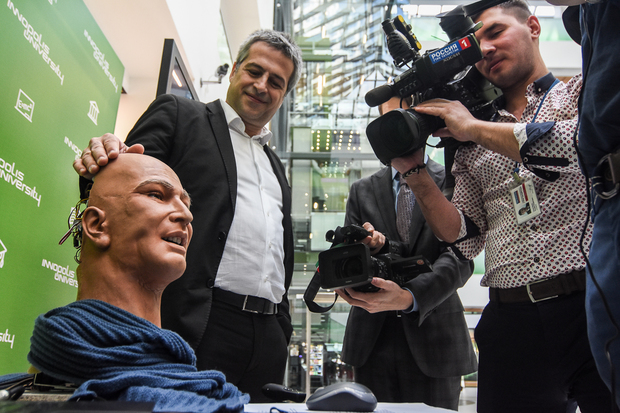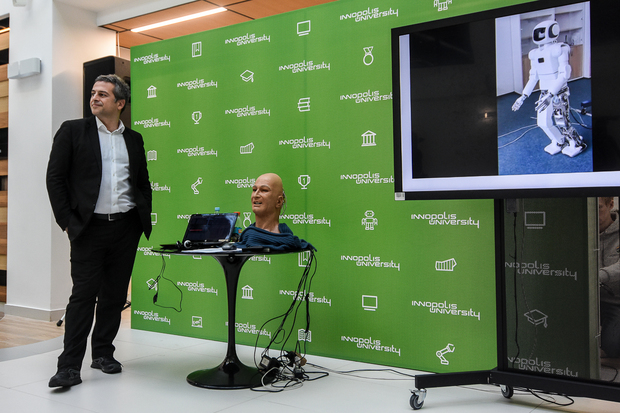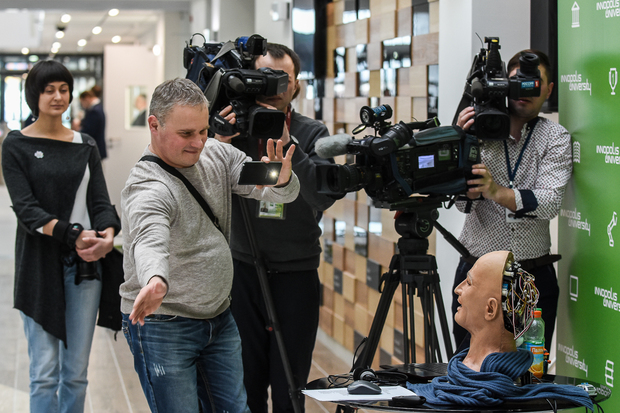Robot creator from Innopolis: ''Smart machines won't be allowed to take humankind over''
Will artificial intelligence enslave people? Do we need to prepare for a rise of the machines? How will robotisation harm? What feelings do unrealistic robots cause among people? Director of Robotics Institute at Innopolis University Nikolaos Mavridis who created an ''emotional'' robot named Gagarin answered these and other questions.
Robotisation will prove us with ''technological unemployment'' or ''era of excess''
Nikolaos, you recently created Gagarin robot that is only a head now. Do you plan to go further and assemble a full-fledged android with arms, legs that can move?
Yes, in Robotics Institute at Innopolis University, we already have a body with arms and legs, we will unite it with Gagarin's head soon. In the future, Gagarin may have arms and wheels instead of legs because this modification is cheaper and preferable in some apps. There is another option (except the head and legs) we are working on…
As the robot develops, it can perform the role of a museum character, shop assistant, reception employee and many others.
What can this technology turn into later? What opportunities for human kind will it open?
Robotics will help humankind stop losing time to solve boring and repeated tasks. Together with artificial intelligence, these technologies will help people show their creative potential and allow to deal with the things that are more important in life. However, we will face an uneasy transition in the short run as more and more working places will be automated.

As the robot develops, it can perform the role of a museum character, shop assistant, reception employee and many others
What do you personally think about robotisation?
There is a growing concern about the so-called ''technological unemployment'' that can arise as a result of a quickly expanding automation. Also, there is an opinion about the ''era of excess'' that humankind can enter when machines are responsible for the majority of boring tasks that are necessary to maintain our level of life. The transition from one to another requires a very careful management of the potential unemployment wave as well as a change of the action of our social and economic system, especially when it comes to the things that motivate people to act and make sense in their life.
It is an undiscovered territory: neither scientists nor politicians know how to handle it. There are many offers: even in the USA, the government started to discuss a possibility of a general basic income, which has never been known before. It will be a time when humankind starts something new, it will be difficult; at the same time, there will be a great potential for the best future of all humankind after the transitional period.
''We need to be more careful about how we imagine smart machines in our lives''
As a scientist, do you believe that the machines can go on strike, which was shot in many films?
No, I don't. Certainly, we need to be more careful about how we imagine smart machines in our lives, in workspace and when we make decisions: we gradually come to ''safe AI'' and ''useful AI'' and find good technological solutions when we made sure that AI benefits us reducing unexpected risks.
There are many philosophic topics on it. For instance, King Midas who had a chance to make wishes real and wished everything he touched turned into gold. However, he could not forecast all consequences of his wish and died from hunger because all food he touched turned into gold. The situation with artificial intelligence is similar — it will aspire to perform its task. And we need to be careful and understand unexpected consequences of our goals. In addition, we need to provide AI with mechanisms that will allow a person to turn it off or change its actions if it's reasonable and necessary.

Artificial intelligence is similar — it will aspire to perform its task. And we need to be careful and understand unexpected consequences of our goals
Will robots be able to manipulate their creators in the future?
Robots and AI have already excelled human intellect in some spheres (for instance, chess, dangers, etc.) but also fall behind some others (sensorimotor abilities at the level of a 5-year-old kid, education, emotional intelligence). But machines constantly improve. This is why, yes, probably once machines will excel human mind in many areas.
I don't know whether this time will have characteristics of singularity as Raymond Kurzweil said. It is likely, I hope, to happen gradually, and humankind will gather necessary knowledge to integrate with smart machines better in life and society minimising risks with a maximum advantage. Considering my answer to the previous question, I think that smart machines won't be allowed to take humankind over. Of course, they will help make more reasonable decisions and make better plans. But their final goal will always be set by people. And people will always take care of it. Humankind constantly learns how to integrate them into our life and society! To get more details about ''useful AI'' I do recommend to watch a video of the January conference in Asilomar (California, USA) where economic, social and technological aspects are explained in a great way.
''Very realistic robots can cause quite strange feelings among people who deal with them''
I can't help but ask you about your creation Gagarin, which is a robot with a human face that ''reads'' emotions from its interlocutor's face. What functions does it perform? When did you start to create it? Why did you choose this name?
In general, the robot is a very realistic human head that has 30 motors that allow the ''skin'' to move accurately to reflect corresponding emotions on its face. It can maintain a dialogue in Russian, show famous astronaut Yuri Gagarin. The robot also can identify things and even emotions on people's face and imitate them.
Actually, his latest version is new! Thanks to incredible efforts of my students, Gagarin has reached the current maturity level within the last several months.
As for the name, when we thought about the creation of a Russian-speaking robot, we wanted to choose a hero of science and technology. And Gagarin suited it perfectly. He also shows that the robot can be used at museums where kids will be able to speak to important historical characters and learn something from them.
Is it true that a Japanese robot named Pepper inspired you?
In fact, Pepper comes from French Aldebran and was purchased by a Japanese company. We like Pepper. We consider it is cool. However, our robot is more realistic than Pepper. Although scientific results of the uncanny valley warn that in some cases very realistic robots can cause quite strange feelings among people who deal with them, the latest research shows that it is not true in this case. Moreover, our own observations demonstrate that people talk to Gagarin well.

Gagarin can maintain a dialogue in Russian, show famous astronaut Yuri Gagarin. The robot also can identify things and even emotions on people's face and imitate them
Does this robot have analogues in the world? What is the difference of Gagarin from other robots of this kind?
Hiroshi Ishiguro created humanlike robots in Japan, but they were based on a completely different technology: pneumatic drill (air-powered pumps are used). What is more, robot Ibn Sina whose face is similar was created by me in the UAE. However, Gagarin's mind is more advanced and demonstrates emotional intelligence, it identifies things, people's gestures and many other things. The most important thing is that Gagarin's mind can dynamically distribute in cloud switching between different services, which makes it more powerful and flexible.
Russian components for the robot and low price for android
Is this creation only for Russia, or do you plan to distribute it worldwide?
The project was created for research and, all in all, to come to the products that will be sold and applied worldwide.
Where do you get components for the robot? Do you think that Russian components will be used? In your opinion, is the Russian industry able to create basic elements for this kind of high-tech things?
In Robotics Institue at Innopolis University, first of all, we create OS (robot's intelligence) and some electronics. In Russia, there is an expert potential to create mechanical components.
How much does the assembled robot cost approximately?
Depending on its configuration, the robot's price today is $5-50,000. But the price will significantly drop in case of mass production.